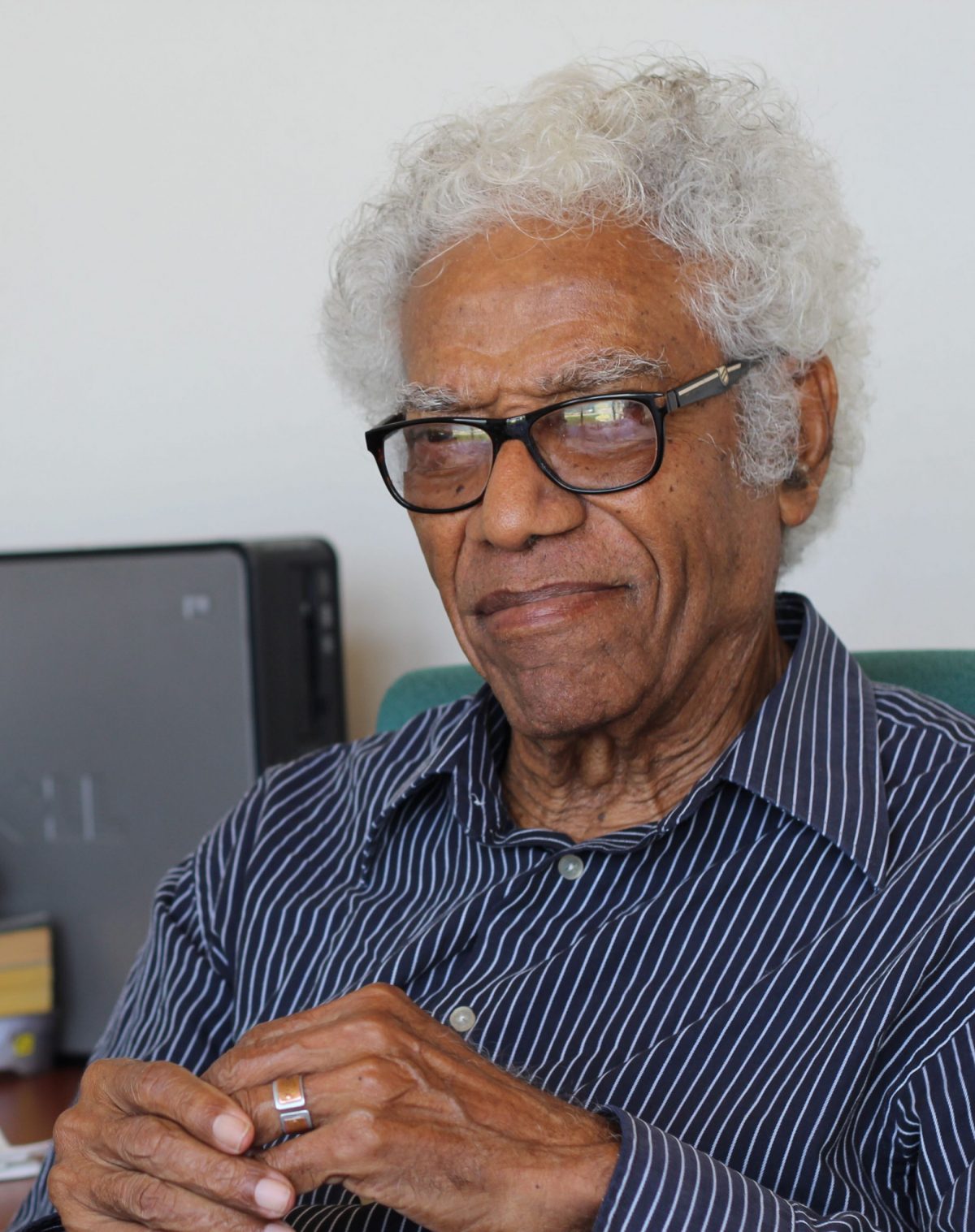 (Barbadian writer George Lamming died on June 4, four days before he would have celebrated his 95th birthday. This revised article, originally written on the occasion of his 94th birthday, is presented today in recognition of his considerable contributions to West Indian literature.)
(Barbadian writer George Lamming died on June 4, four days before he would have celebrated his 95th birthday. This revised article, originally written on the occasion of his 94th birthday, is presented today in recognition of his considerable contributions to West Indian literature.)
In the room the clock thunders on the mantle
The brittle china shepherdess holds
Her crook like a question sign, asks
Why your complexion should have held you from me.
You in the castle of your skin, I the swineherd.
Derek Walcott, from ‘Epitaph for the Young: XII Cantos’ (1949)
To be a colonial is to be a man in a certain relation; and this relation is an example of exile.
My subject is the migration of the West Indian writer, as colonial and exile, from his native kingdom, once inhabited by Caliban, to the tempestuous island of Prospero’s and his language. This book is a report on one man’s way of seeing.
George Lamming from The Pleasures of Exile (1960)
Caribbean nationhood has been, through a history marked by colonial imperialism, plunder, triumph and glory, intricately associated with and profoundly defined by its literature. This literature has been indivisible from history, international scholarship, and Caribbean philosophical thought. By analysing West Indian realities, the artists of the region have guided audiences through tragedy and comedy, and with the aid of those mirrors have never ceased, as VS Naipaul observed, “to tell us who we are”.
Among the Caribbean writers who contributed to the building of that nationhood through his entertaining story-telling in fictional narratives, his deep and ever-relevant scholarship, and his interventions in regional thought and philosophy, was George Lamming (June 8, 1927 – June 4, 2022), acclaimed novelist, poet, critic, commentator and activist. He was born in Carrington Village, Barbados and worked as a teacher in Trinidad from 1946 until he migrated to England in 1950. As a part of the legendary ‘Windrush’ generation he was among leading West Indian writers alike, who went into “exile” to develop their careers and were responsible for the main thrust in the rapid growth to prominence of West Indian literature in London in the 1950s.
The ship MV Empire Windrush docked at Tilbury in England on June 22, 1948 landing 492 workers from Jamaica, Trinidad and Tobago and other West Indian islands, who, according to the BBC (July 31, 2020) arrived “to help fill UK labour shortages”. That was the start of the historic migration to the UK, which also saw arrivals from India, Pakistan and Africa, and the root of the “Windrush scandal” which broke in April, 2018. This saw “the UK government apologise for deportation threats made to the children of Commonwealth citizens. Despite living and working in the UK for decades many were told they were there illegally because of a lack of official paperwork”. (BBC, July 31, 2020).
But that was only the latest in a history of scandals that followed the Windrush, concerning race relations in the UK. The stormy existence of these immigrants was taken up by Lamming in his fiction and nonfiction. It is significant that this post-war exodus also gave rise to the development of one of the most important literary movements in the modern world post-colonialism. It was born of migration from Commonwealth countries, former colonies in the British Empire, the UK experience, the quest for independence among those nations, and what all that reflected in the style and preoccupations of the writers at home and in the UK.
Most of the major players in the rise of this literature were fellow migrants with Lamming seeking to build their careers in a land of opportunity, which was as ironic and deceptive as Lamming perceived and described it in his nonfiction writings. One of Lamming’s travel companions on the vessel in 1950 was Trinidadian Sam Selvon, who Lamming said showed him the unfinished manuscript of the now famous novel A Brighter Sun. VS Naipaul, also in 1950, Jamaican Andrew Salkey, and Guyanese Edgar Mittelholzer, at other times, also travelled to Britain with ambitions of becoming professional writers.
Lamming started writing as a poet. His considerable impact on the world’s literature deepened through his literary criticism, his consistent contributions to Caribbean postcolonial thought and to the philosophical underpinnings of regional poetics and historiography. Much of this is underlined in his ground-breaking nonfiction publication The Pleasures of Exile (1960), whose ironic title and occasionally controversial commentary set the record straight about the concept of exile and the emergence of great literature. This remains Lamming’s most critical intervention which contains his unforgettable declaration that “English, after all, is a West Indian language”.
The Pleasures of Exile was one of the first, and a major intervention in Caribbean criticism because of and in spite of the date of its publication, 1960, early in the era of the developing literature. It had no prescriptions to follow, and some of its judgments – in particular its criticism of Naipaul – were fairly premature. Yet Lamming got it right in his postcolonial positions. Highly acclaimed among his literary interventions is his postcolonial reading of Shakespeare’s The Tempest, casting the Prospero-Caliban relationship as the West Indian colonial experience. Yet he claimed the language of the oppressor English as his own, enlarging the position that England has no monopoly ownership of the language used, beside Creole, by Caribbean writers; seeing English, as Walcott also came to do, as a language of West Indian literature. A position adopted by some radical thought, Lamming’s is taken by the region’s contemporary linguists. It is of note, also in The Tempest, that Caliban makes the best use of Prospero’s language, in ironic opposition to his declaration: “You taught me language, and my profit on it is, I know how to curse. The red plague rid you for learning me your language”.
Lamming’s place in the literary world was immovably entrenched by his quarrel with history as a critic and as a novelist. The first of his six novels, also emphatically ground-breaking, was In The Castle of My Skin (1953), which was autobiographical, but an archetype to the bildungsroman in the Caribbean: novels about growing up in the West Indies to tell the story of colonial education, village life, and the quality of pre-independence colonialism in the Anglophone Caribbean.
The novel bears another of Lamming’s ironic titles, and was taken from the very early work of Derek Walcott, the poem “Epitaph for the Young: XII Cantos” (1949). The lines of Walcott’s poem are: “You in the castle of your skin, I the swineherd.” The hero is a boy named “G” in what critic Sandra Pouchet Paquet calls an “autobiographical novel of childhood and adolescence”, in the 1930s – 40s, starting on his ninth birthday and ending on his departure for Trinidad to work as a teacher. The exact journey was taken by Lamming at the age of 19. It is a type of novel very common among West Indian novelists. The coming of age of the hero is indistinguishable from that of his native land under British colonialism, and included several postcolonial ironies and subtleties of which Lamming became aware on his journey into London alongside Selvon.
The novel Water With Berries (1971) continues the quarrel with history waged by a writer perpetually conscious of a people’s need for liberation and their relationship with the colonial experience. The title also has intertextual resonance, not without the usual ironic approach. It resonates with a story told about Columbus’s arrival in the Caribbean. After sailing for an unbearably long time without arriving at his intended destination, the explorer was facing rebellion among his men. But in the very nick of time he saw floating on the water, a little branch with berries on it. Columbus wrote in his journal “The crew of the caravel ‘Nina’ also saw signs of land, and a stalk loaded with rose berries. Everyone breathed afresh and rejoiced at these signs” (1492). Soon after they made their first landing. Columbus proceeded thereafter to claim islands in the name of the King and Queen of Spain. Since his plan was to prove that he could get to India in the east by sailing west, the islands were called the West Indies.
Lamming has had reasonable association with Guyana. He once served as a member of the jury of the Guyana Prize for Literature. Long before that he was deeply involved in the New Word Quarterly in Guyana, a companion journal to literature, politics, and society (1963 -1972). The New World group had its origins in Guyana in 1963 but in some years struggled to keep up its publication because of funding. The journal ended up on the Mona Campus of UWI in Jamaica. Among the associates in Guyana were David de Caires and Miles Fitzpatrick, who kept up the publication and, according to de Caires, invited Lamming to work with them, particularly on a planned independence issue in 1966 on which Ian McDonald also worked.
Lamming wrote six novels. In The Castle of My Skin was first published by Michael Joseph, London, 1953. Of this, he said: “The novel was completed within two years of my arrival in London. I still shared in that innocence that had socialised us into seeing our relations to the empire as a commonwealth of mutual interests”. His other novels were The Emigrants (1954); Of Age and Innocence (1958); Season of Adventure (1960); Water With Berries (1971) and Natives of My Person (1972). His nonfiction works were The Pleasures of Exile (1960); Coming, Coming Home: Conversations II, (1995) and Sovereignty of the Imagination: Conversations III, (2009).









